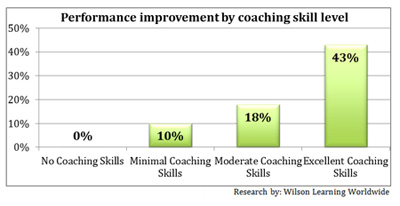Le leadership commercial
2 mesures clés qui accroissent la performance de vente

True sales effectiveness requires creating and building manager skills and a management culture that adds value to the sales force.
It happens all the time: The top salesperson gets promoted to sales manager. The organization soon discovers, however, that the skills and perspectives that made this person a top salesperson are not contributing to success as a sales manager, and may in fact be detrimental to the sales role.
Many of the perspectives and skills a salesperson acquires in developing an effective sales approach are inconsistent with the perspectives, skills, and environment of a sales manager.
Multiple studies have shown that effective sales management—with different roles and approaches than pure sales—has a significant impact on positive sales results. If an organization only focuses on the skills of their salespeople, to the exclusion of sales management, they miss an important opportunity to increase performance.
THE CHANGING ROLE OF THE SALES MANAGER
In the past, the sales manager's job was limited to hiring and then keeping strong sales performers and managing sales activities (number of calls, proposals, wins, etc.). Typically, this sales manager came from the ranks of top salespeople and was rewarded with a management position, often without sufficient training.
Today, sales managers are still recruited from the ranks of the sales team, but they play a more vital role in creating sales effectiveness. Research shows that sales managers who engage their salespeople, coach effectively, and lead through a systematic sales process have higher win/loss ratios, higher revenue, and lower salesperson turnover.
The keys to effective sales leadership are:
- Managing the Sales Process
- Leading for Engagement and Performance
Successful sales leaders embrace this dual role. First, they recognize that effective sales leadership involves supporting salespeople in executing the entire sales process. These sales leaders keep current on the status of sales opportunities and provide support and guidance through all steps of the sales process, without trying to take control.
In addition, effective sales leaders recognize that the salesperson's environment is filled with tremendous ups and downs: win a big sale or account and the salesperson feels on top of the world; lose a customer or a big opportunity and that salesperson feels that the world has ended. Effective sales leaders know that a major part of their job is dealing with this emotional turbulence, providing salespeople with focus and direction, and create an effective sales team.
MANAGING THE SALES PROCESS
The first step in being a successful sales leader is managing the sales process.
This is often a controversial issue, and one that can make the transition from salesperson to sales manager difficult. After all, isn't it the job of the salesperson to manage the sales process?
The answer is no! Salespeople execute on the sales process; sales leaders manage the sales process. In other words, the job of salespeople is to move a client or opportunity from initial qualification to a win. The job of the sales manager is to coach salespeople in each step of the process, analyzing inefficiencies in how the process is executed and working to improve the effectiveness of each process step.
Research by CSO Insights, Aberdeen, and others concludes that sales organizations that follow a systematic sales process have higher levels of sales performance. But installing a sales process is only half the battle. Salespeople have to use the process, and sales managers have the greatest impact on whether or not the sales process is used consistently. Research by Ventana Research identified poor management of the sales process as the major sales force dysfunction. While a majority of organizations report having a sales process, a majority of salespeople report not using it.
Successful managers do more than just "manage" the sales process; they work it! This means more than making sure salespeople enter information into complicated CRM systems. Effective sales managers know how to use the process to track key leading indicators, conduct pre- and post-sale reviews, and help salespeople problem-solve issues. Effective sales leaders encourage salespeople to follow the process by making it relevant to their own success, not just the organization's.
LEADING FOR ENGAGEMENT AND PERFORMANCE

With a highly mobile and distributed sales force, keeping salespeople engaged with the organization is a challenge. In fact, in a study by Krauthammer International, 52% of salespeople reported not having had a performance review for over six months. Effective sales managers have learned how to create high levels of engagement. One of the key skills is their ability to coach. Research by CSO Insights and Aberdeen shows that managers who coach effectively have higher levels of sales performance. Our own research shows that as managers' coaching skills increase, the performance of their salespeople increases by up to 43 percent.
WHAT IS EFFECTIVE COACHING?
Sales coaches are experts in both the sales process and the process of helping people learn to do things better in an independent way. Here are four guidelines for effective coaching:
1. Good coaches work in a context.
Individuals and organizations seek out a coach because something in their environment has changed and they have become consciously incompetent as a result of this change. This provides the context for the coaching relationship. When new leads have decreased and a salesperson wants to develop a particular skill as a result (prospecting), the coach can target that skill specifically, providing the context.
2. Good sales coaches focus on the salesperson.
With the context set, the good sales coach knows that he or she cannot set the goals for the salesperson. The salesperson has to define and ultimately own the goals for the coaching relationship. This is because the goals have to meet certain criteria in order to serve as a strong motivating device.
- The salesperson must feel like he or she can succeed at each goal.
- The salesperson must see a clear benefit for achieving each goal.
- The salesperson must value the benefit.
The good sales coach works together with the salesperson to build clear goals that inspire success, fit in the overall growth plan, and align with what the salesperson defines as valuable to him- or herself and to the organization.
3. Good sales coaches protect the relationship.
The good coach understands that a strong coaching relationship is founded on trust. If a salesperson worries that every time there is a stumble or difficulty the coach will report back to management, then the salesperson will only take on things that are safe. This limits growth. A good sales coach keeps information about the relationship privileged. The good coach also encourages both the salesperson and management to talk about the coaching relationship to make sure expectations and support needs are addressed.
4. Good coaches provide feedback, not judgment.
Done correctly, the coaching relationship is about growth and doing better. It is not about appraisal. Good sales coaches offer feedback—information, not judgment, about current performance that affects future performance—in a positive way. Salespeople know when they fail. What they need to know is what influenced their performance and what they can do to be better.
Today's complex sales environment often means that multiple functions are involved for a sales manager who is a true leader in the sales process and the organization. Effective sales managers manage the links across these silos in their organization, making sure that salespeople provide others with the information they need to make decisions and take action, and making sure that others see their job as sales enablement and not sales prevention.
Pour en savoir plus, contactez Wilson Learning au 01 47 51 70 70 or rendez-vous sur notre site Internet at WilsonLearning.com.








 Merci de remplir ce formulaire afin de télécharger Le leadership commercial | 2 mesures clés qui accroissent la performance de vente».
Merci de remplir ce formulaire afin de télécharger Le leadership commercial | 2 mesures clés qui accroissent la performance de vente».



